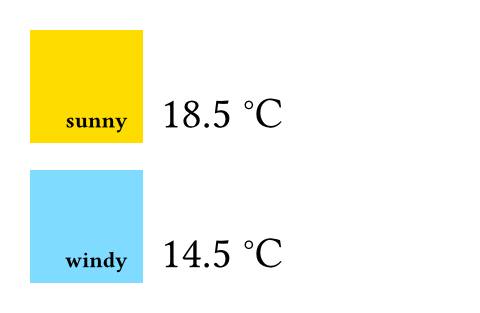json
Reads structured data from a JSON file.
The file must contain a valid JSON value, such as object or array. JSON
objects will be converted into Typst dictionaries, and JSON arrays will be
converted into Typst arrays. Strings and booleans will be converted into the
Typst equivalents, null will be converted into none, and numbers will
be converted to floats or integers depending on whether they are whole
numbers.
Be aware that integers larger than 263-1 will be converted to floating point numbers, which may result in an approximative value.
The function returns a dictionary, an array or, depending on the JSON file, another JSON data type.
The JSON files in the example contain objects with the keys temperature,
unit, and weather.
Example
#let forecast(day) = block[
#box(square(
width: 2cm,
inset: 8pt,
fill: if day.weather == "sunny" {
yellow
} else {
aqua
},
align(
bottom + right,
strong(day.weather),
),
))
#h(6pt)
#set text(22pt, baseline: -8pt)
#day.temperature °#day.unit
]
#forecast(json("monday.json"))
#forecast(json("tuesday.json"))

ParameterParameterParameters are input values for functions. Specify them in parentheses after the function name.
DefinitionsDefinitionsThese functions and types can have related definitions. To access a definition, specify the name of the function or type, followed by the definition name separated by a period.
decode
encode
Encodes structured data into a JSON string.
valueanyRequiredRequiredRequired parameters must be specified when calling the function.PositionalPositionalPositional parameters can be set by specifying them in order, omitting the parameter name.
Value to be encoded.